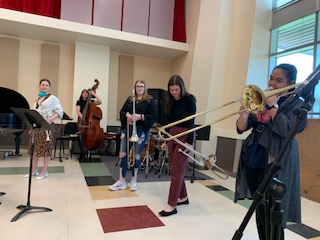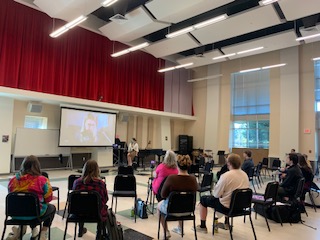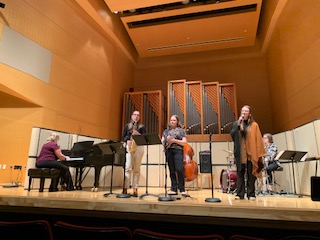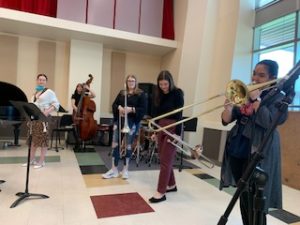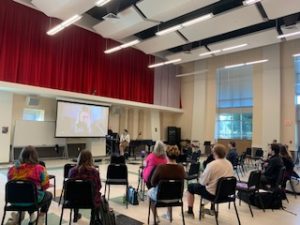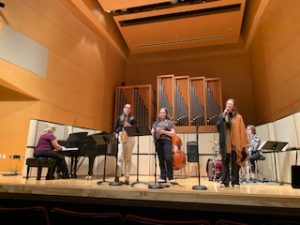CWU Jazz Education Network celebrates fourth annual Women In Jazz Day
April 27, 2022
Upon entering the CWU music building, fliers and Jazz Education Network (JEN) club members greeted Women In Jazz Day participants on April 22 as the sound of trumpets and bass welcomed attendees down the halls, a unique female musician experience awaiting them.
Women In Jazz Day is an opportunity to celebrate and recognize successful women in the field of jazz and encourage a stronger community of female and non-binary jazz musicians.
“Firstly, jazz is important in general, because it’s the only part of mainstream public music education that is taught everywhere that’s not white, eurocentric music,” said Shaina Ellis, president of JEN club.
According to Ellis, “eurocentric” refers to classical music that was composed primarily by deceased white people from Europe.
“That music is not representative of our students’ culture,” Ellis said. “But for women specifically, Women In Jazz Day is important in inspiring young girls to pursue jazz.”
The first half of Women In Jazz Day was filled with female jazz clinicians joining participants at home and at CWU over Zoom.
During the first round of clinic sessions starting at 10 a.m., saxophone artist and jazz clinician Alexa Tarantino emphasized the significance of goal setting, community and mindset in the pursuit of success as an independent musician.
Having attended the event twice before, vocal performance major Mairead Rising said she continues to be blown away by the talent demonstrated during Women In Jazz Day.
“It’s so empowering to see a bunch of women on stage, making amazing music and it makes me think I can do that too,” Rising said.
Trumpet professional and jazz clinician Chloe Rowlands used her trumpet skills to exemplify emotion in music. Audience members were encouraged to give examples of emotions for Rowlands to portray with her trumpet. Audience members suggested curiosity, playfulness and sorrow.
Bass professional and jazz clinician Noriko Ueda led the “Bassist’s Point of View” clinic session, with insight on the role of leaders in music.
The second round of clinic sessions was led by drum expert Karina Colis, improvisation expert Arietta Ward and trombone expert Kalia Vandever.
Ward spoke about improvisation concepts and skills in music. Requesting volunteers from the audience, Ward demonstrated her vocal improvisation expertise and did unique renditions of “The Itsy Bitsy Spider” alongside the participant volunteer.
Vandever presented a video of a performance of hers alongside her jazz band members. Vandever then transitioned into a Q&A and participants posed questions about how to further their music careers.
At noon, the six masterclasses commenced. The masterclasses offered were saxophone, vocal, trumpet, trombone, drums and bass, and were interactive sessions with the coordinating professional musician.
The masterclasses were meant to give each participant a chance to implement the technical tips the clinicians had given earlier in the day, in a more personal setting alongside the clinicians.
At 1 p.m. Women In Jazz Day held a panel discussion with the clinicians as panelists. The purpose of this discussion was to have a more intimate conversation about the female and non-binary experience in the music industry, specifically within jazz.
“It’s important to make sure that everyone is represented and to dismantle the patriarchal system that is in place in the jazz world,” said Rowlands. “There is a notion that instruments have gender, and as educators out there, tear that down and destroy it.”
As recognition for women and nonbinary people has always been an issue in the jazz scene, Vocalist Arietta Ward inquired about diverse representation for young girls and women in jazz.
“Visibility is very important to encourage, but also to reach out. If you see someone that has that spark in them, try and find a way to cultivate it. And feature pieces by women composers,” Ward said.
A major disparity in music is the lack of non-male unity. According to Vandever, it’s important for women involved with jazz to find a support group in order to stay encouraged.
“Find your people, find your support group. I fear that younger women will see that jazz is male dominated and choose not to pursue it, so it is important to find other women and like minded individuals along the way,” Vandever said.
Women and nonbinary people were invited to join in a jam sesh led by Lady Cat members at 3:30 p.m. in the band room. Lady Cats are an all-women music group based in central Washington.
The energy of the music and people in the room was filled with life, and the JEN club provided a safe, welcoming space exclusively for women and nonbinary musicians. According to Rising and Ellis, this is very hard to come by.
Those that participated in the jam sesh were asked by the Lady Cat members to join them on stage during their performance that would be taking place that evening.
Women In Jazz Day wrapped up with a lively performance by the Lady Cats that wowed the audience. As their performance came to a conclusion, the nonbinary and female participants of the jam sesh were invited onstage with the Lady Cats and brought the empowering day to an end.


